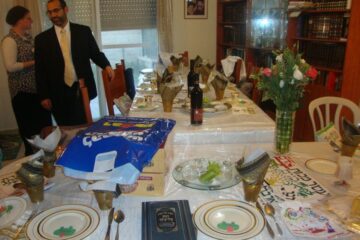In all of Judaism there couldn’t be any less appropriate shidduch than Shabbos and Tisha B’av. Can we really pair paradise, oneg, delight, rest, relaxation with death, destruction, Inquisition, and Holocaust?
However, our calendar and its masterminds decided that Tisha B’av and Shabbos can be paired together.
There are some important halachik ramifications when Tisha B’av occurs on Shabbat. Without giving a halachik decision, there are unique restrictions involving Torah learning, seuda shlishit and marital relations, among other things. (See Shu”A/M”B section 552, 554 and KS”A section 125.)
There seems to be a deep message behind Tisha B’av falling out on Shabbat. What is that message?
Secondly, when Tisha B”av falls out on Shabbos Rebi Yehuda Hanasi wanted to nullify Tisha B”av altogether. (Gemara Megilla 5b). The great compiler of the Mishanah reasoned, “Since it is pushed off, it should be canceled completely.” Even though the halacha is not like Rebi, he is teaching us an important idea. What is Rebi teaching us?
There can be no denying that our People, at different periods, in various degrees, has been through hell on earth and then back again. I heard in person Rav Mordechai Sheinberger of the Old City of Jerusalem say at a Brit Millah, “Throughout Jewish history the Jews have been more loyal to God than God has to the Jewish People.” If it wasn’t said by a great sage in our generation I would have considered it to be heresy. This shocking statement is indeed very telling about the unfortunate and tragic exile we have endured since the destruction of the Second Temple 1,950 years ago.
Nonetheless, every Shabbat at least three times we sing “Shir Hamaalot” (Tehilim 126). That joyous song expresses that, “when God brings us back to Eretz Yisrael ‘Tzion’ we will be like dreamers.” The Rada”k explains that when the long awaited period of the exile ends, past oppression will fade away like a bad dream. As difficult as it is to suffer the way the Jewish People have suffered, Shabbat reminds us that one day it will all be forgotten completely.
It is true that in a fleeting, ephemeral, transitory, short-lived world, Tisha B’Av, at times, does feel stronger than Shabbos. However, truly righteous people are able to experience two polar opposite realities existing simultaneously. On the one hand they feel the pain of the tragedies we as a people and we as individuals experience. On the other hand they have deep appreciation and inner understanding that Jewish pain and suffering is not eternal; it is a stage. Ultimately, in the big picture – Shabbos trumps Tisha B’Av.
A discussion of paradise and Gehenna overlapping makes us recall Shabbos in the Warsaw Ghetto.
The City of Warsaw was captured by the Germans in late September of 1939. Shortly before the war the Piaseczner Rebbe, Rabbi Klonymus Kalman Shapira ZT”L, who at this point resided within the area which soon would be part of the Ghetto, lost his dear wife, Rebbetzin Chayyah Shapira ZT”L. The heaviest bombardment of the Nazis took place during the High Holidays in 1939. On the day after Yom Kippur, Monday, September 25th, “a day of exceptional savagery” the Rebbe’s only son, Elimelech Shapira, was mortally struck in the arm by shrapnel from a German bomb. He passed away a few days later. The Rebbe’s daughter-in-law and her sister, who were waiting outside of the hospital, were also killed in a bombing during this time.

In the midst of losing his entire family, the Piaseczner Rebbe erected a small Sukka, instructed the Chazzan to sing all of the special Yom Tov melodies on Sukkot and danced with the Torah and his Chassidim on Simchat Torah. Just as remarkable is the fact that from 1939-1942 the Piaseczner Rebbe stayed active and dedicated to inspiring and lifting the spirits of fellow Jews on Shabbos in the Ghetto. His special teachings that he recorded during these years, can be found in his work, Aish Kodesh.
The Piaseczner Rebbe is one of countless tzaddikim that persevered during life’s most horrific times – a personal Tisha B’av – with the understanding that ultimately Shabbos triumphs over Tisha B’av. This inner knowledge gave the Rebbe the strength to persevere and add so much light to a dark world.
These are not theoretical ideas reserved for other worlds and other times. Our generation is currently experiencing lots of struggles and ordeals. At times, we feel deep pain and suffering. This Shabbos is our chance to experience, internalize and incorporate into our life that the tachlis (bottom line) is that the light of Shabbos shines much brighter than the darkness of Tisha B’av. One day the darkness of the exile will be lost and forgotten. May it be soon in our time.
Shabbat Shalom,
Shalom Tzvi



0 Comments